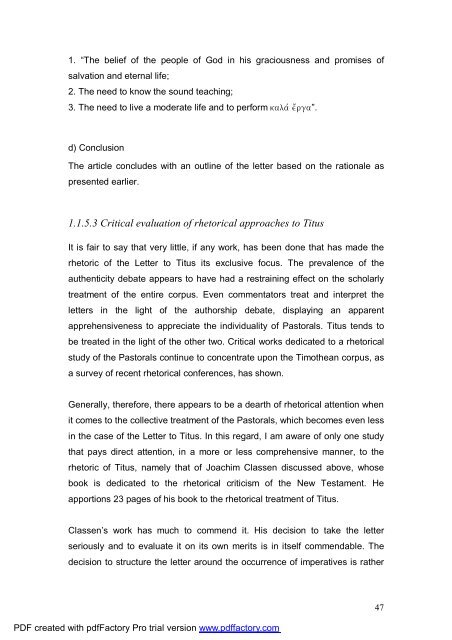A Text centred rhetorical analysis of Paul's Letter to Titus
A Text centred rhetorical analysis of Paul's Letter to Titus
A Text centred rhetorical analysis of Paul's Letter to Titus
Create successful ePaper yourself
Turn your PDF publications into a flip-book with our unique Google optimized e-Paper software.
1. “The belief <strong>of</strong> the people <strong>of</strong> God in his graciousness and promises <strong>of</strong><br />
salvation and eternal life;<br />
2. The need <strong>to</strong> know the sound teaching;<br />
3. The need <strong>to</strong> live a moderate life and <strong>to</strong> perform kalav e[rga”.<br />
d) Conclusion<br />
The article concludes with an outline <strong>of</strong> the letter based on the rationale as<br />
presented earlier.<br />
1.1.5.3 Critical evaluation <strong>of</strong> <strong>rhe<strong>to</strong>rical</strong> approaches <strong>to</strong> <strong>Titus</strong><br />
It is fair <strong>to</strong> say that very little, if any work, has been done that has made the<br />
rhe<strong>to</strong>ric <strong>of</strong> the <strong>Letter</strong> <strong>to</strong> <strong>Titus</strong> its exclusive focus. The prevalence <strong>of</strong> the<br />
authenticity debate appears <strong>to</strong> have had a restraining effect on the scholarly<br />
treatment <strong>of</strong> the entire corpus. Even commenta<strong>to</strong>rs treat and interpret the<br />
letters in the light <strong>of</strong> the authorship debate, displaying an apparent<br />
apprehensiveness <strong>to</strong> appreciate the individuality <strong>of</strong> Pas<strong>to</strong>rals. <strong>Titus</strong> tends <strong>to</strong><br />
be treated in the light <strong>of</strong> the other two. Critical works dedicated <strong>to</strong> a <strong>rhe<strong>to</strong>rical</strong><br />
study <strong>of</strong> the Pas<strong>to</strong>rals continue <strong>to</strong> concentrate upon the Timothean corpus, as<br />
a survey <strong>of</strong> recent <strong>rhe<strong>to</strong>rical</strong> conferences, has shown.<br />
Generally, therefore, there appears <strong>to</strong> be a dearth <strong>of</strong> <strong>rhe<strong>to</strong>rical</strong> attention when<br />
it comes <strong>to</strong> the collective treatment <strong>of</strong> the Pas<strong>to</strong>rals, which becomes even less<br />
in the case <strong>of</strong> the <strong>Letter</strong> <strong>to</strong> <strong>Titus</strong>. In this regard, I am aware <strong>of</strong> only one study<br />
that pays direct attention, in a more or less comprehensive manner, <strong>to</strong> the<br />
rhe<strong>to</strong>ric <strong>of</strong> <strong>Titus</strong>, namely that <strong>of</strong> Joachim Classen discussed above, whose<br />
book is dedicated <strong>to</strong> the <strong>rhe<strong>to</strong>rical</strong> criticism <strong>of</strong> the New Testament. He<br />
apportions 23 pages <strong>of</strong> his book <strong>to</strong> the <strong>rhe<strong>to</strong>rical</strong> treatment <strong>of</strong> <strong>Titus</strong>.<br />
Classen’s work has much <strong>to</strong> commend it. His decision <strong>to</strong> take the letter<br />
seriously and <strong>to</strong> evaluate it on its own merits is in itself commendable. The<br />
decision <strong>to</strong> structure the letter around the occurrence <strong>of</strong> imperatives is rather<br />
PDF created with pdfFac<strong>to</strong>ry Pro trial version www.pdffac<strong>to</strong>ry.com<br />
47

















